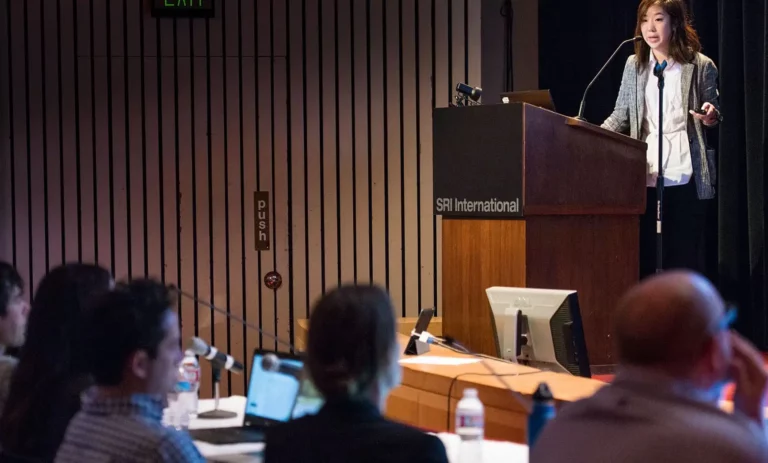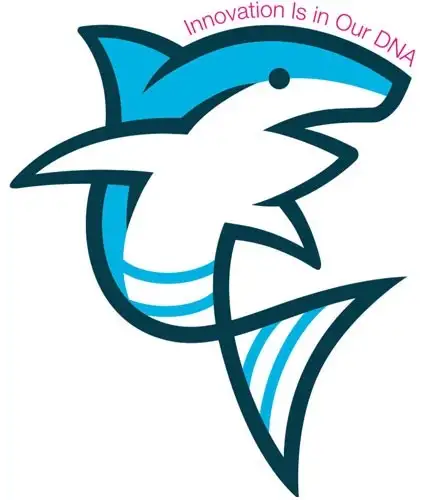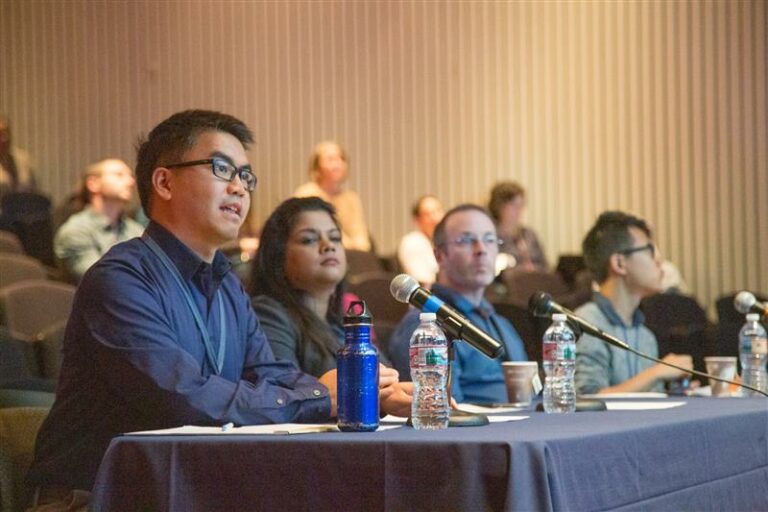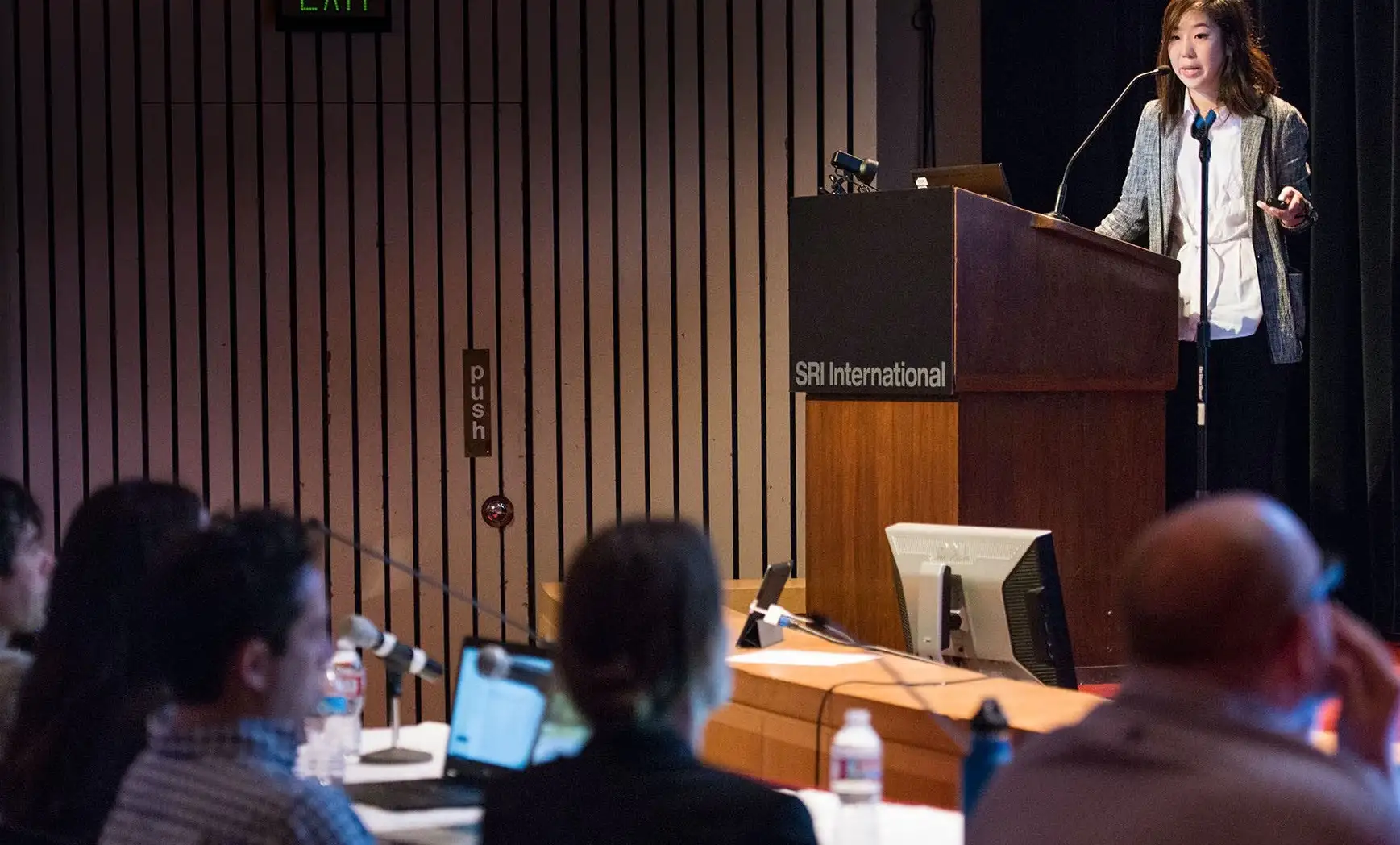The program encourages early-career researchers to pitch impactful projects that could receive up to $100,000 in funding

SRI International is synonymous with innovation, and Inception Drive, a robotics engineering advancement originally funded by an internal initiative, embodies that.
Inception Drive is an ultra-compact, infinitely variable transmission that promises to dramatically increase efficiency for robotics systems and allow for safer human-robot interaction. With its high torque and power density, Inception Drive is small enough to replace fixed-ratio transmissions in robots, enabling energy savings of up to 50 percent in many applications. Furthermore, the transmission’s reversible output can allow for the reduction of the number of motors required in a robot.
This novel engineering advancement by researcher Alexander Kernbaum is a prime example of what flourished under an internal research and development program at SRI. The program gives early-career researchers at the nonprofit the opportunity to pitch and run their own projects for what is often the first time.
Inspired by the hit TV show Shark Tank®, and operated in a similar pitch competition format, the dynamic program has hatched a variety of exciting projects beyond Inception Drive. More fundamentally, the program has provided emerging researchers with a chance to craft their own project and hone their pitching skills in a competitive process similar to what they’ll encounter in the marketplace.
“The main goal of the program is to show applicants what it takes to put together a convincing proposal,” explains Iris Jiang, the SRI business development manager who co-leads the program along with Carolyn Westgaard, learning and development manager. “The added benefit is to fund interesting projects that may not receive attention via normal avenues at SRI.”
How it works
Launched in 2016, the program is a kind of “IRAD-lite.” Typical internal research and development (IRAD) initiatives focus on projects that would require several years of work and more ample funding/resources, among other things, including being spearheaded by senior staffers.

However, the program has grown to be a part of SRI’s brand-new project leader development initiative. One component of this initiative is its close alignment with the Business Development Mentoring Program which supports early career research project leaders in strengthening their business development skills. Similar to the dynamic research and development program, the developmental program invites early-career mentees participate in elevator pitch training sessions. It also includes extensive coaching on pitching ideas and encourages researchers to submit proposals to the program as part of their development.
Accordingly, project proposals are scoped to their capabilities and intended to be completed in one year. In many cases, these projects have multi-year roadmaps that include scaling up to a full IRAD — such as Inception Drive — or serving as a steppingstone toward federal grants (as with Qbot, below).
In addition to developing early-career Principle Investigators, this program also recruits judges from across the institute who are early-mid career researchers. The judges experience sitting on the other side of the table, examining what makes a proposal stand out, which in turn, they can use to improve their own proposal writing skills.
Of the written proposals submitted, the panel of judges review and select six finalists to appear before a live audience and pitch their projects. The finalists spend two weeks preparing their presentations, receiving presentation coaching and practicing their pitches — unlearning the natural researcher tendency to use lots of jargon and assumed knowledge. “Our aim is to help these researchers communicate their complex ideas clearly to people who may not have the same technical background,” notes Jiang. “We hope these skills can help foster more interdisciplinary conversations and research across the institute.”

Ultimately, two winners earn the chance to have their proposals funded. The community of mentors, past winners and judges all become available to the winner to serve as resources for keeping the project on track.
Research that resonates beyond the competition
However, it’s not just winning proposals that are funded and make an impact in their respective sphere of research. Sometimes, proposals not selected still come to fruition as highly successful projects.
Researcher Samson Phan’s Qbot is an excellent example.
Qbot is a semiautonomous, dual-armed robot constructed for complex operations in outer space. Built using technology from the Taurus Dexterous Robot, an SRI tele-operated solution that provides precision manipulation for remote applications, Qbot contains a variety of modifications specifically for space missions. Its numerous applications can include in-space equipment assembly, satellite inspection and repair, deep space exploration and assisting astronauts perform hazardous tasks in space.
The program has evolved from its stand-alone beginnings. Given its success stories and resounding support from the community it has created, SRI plans to expand the competitive program for early career researchers. “We also always work to enhance or improve the program along the way,” says Jiang. “The program provides significant value. It’s a great example of how we’re always striving to innovate here at SRI.”
Funding and development outside the program has blossomed as both winning and runner-up projects, and the researchers behind them, continue to have lasting impact. The SRI community continues to evolve, leading to the creation of exciting projects and collaborations while also enabling new programs in support of career development and leadership.
Interested in a career at SRI? Learn more about our opportunities at sri.com/careers.
Shark Tank is a trademark of Sony Pictures Television Inc. SRI International is not affiliated with, sponsored by or endorsed by Sony Pictures Television, Inc.




